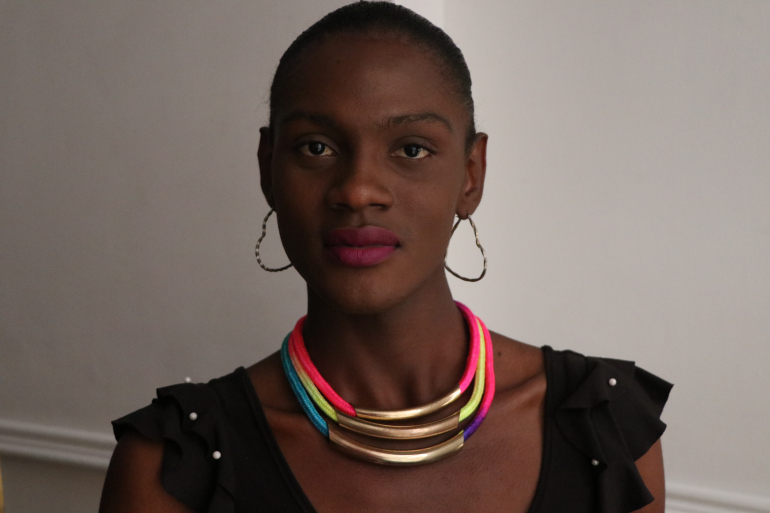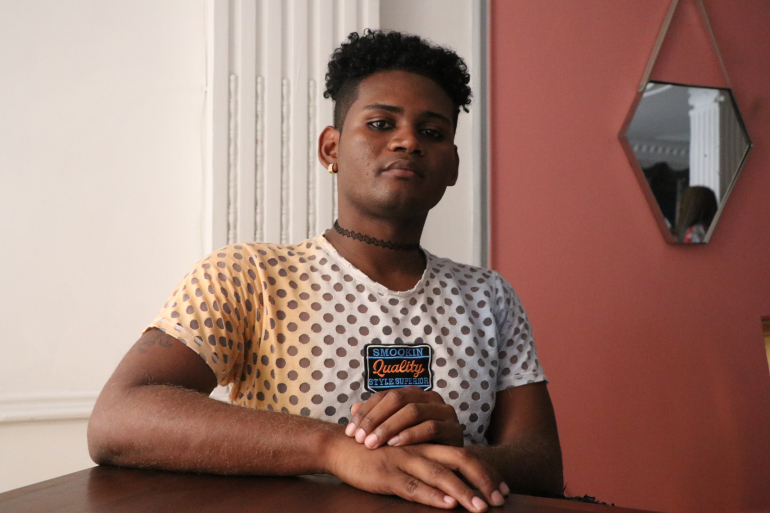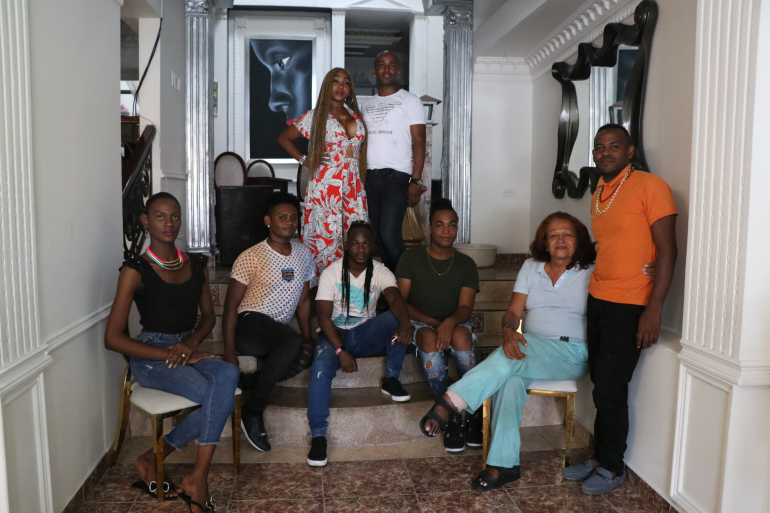Buenaventura, Colombia – Gisela Diaz, 40, bursts into tears as she recalls the years of violence and discrimination she and her LGBTQ friends have endured in their troubled city.
“The situation is very difficult [for LGBTQ people] here in Buenaventura,” says Diaz, who identifies as a lesbian.
A main Afro-Colombian port city on Colombia’s western coast, Buenaventura has long been considered one of the most violent places in the country. It was here the “casas de pique” (Spanish for chop houses) operated, where armed groups would dismember victims and dispose of their bodies in the adjacent Pacific Ocean.
In 2019, Buenaventura held its first LGBTQ pride parade, something previously unheard of in the traditional and machista, or male chauvinist, city. John Albornoz, a gay man who proposed and coordinated the event, says it was a momentous day for the city’s LGBTQ community.
“In that year the armed gangs who fought for territorial control were going through a period of peace. So we had the freedom to be,” Albornoz, 46, said.
But Albornoz, who runs a local LGBTQ rights group, says he would not attempt to organise a pride celebration in Buenaventura’s current violent climate.
“It’s horrible. Young friends of ours had to flee the city because of the violence that’s happening, because unfortunately the violence we’re seeing in marginalised neighbourhoods is where many members of our [LGBTQ] community live,” Albornoz said.
Al Jazeera spoke to nine members of the LGBTQ community in Buenaventura. All confirmed the new wave of violence has directly affected them or other LGBTQ individuals they know in the city.
Death threats
In the second half of 2020, violence intensified in Buenaventura as Los Chotas and Los Espartanos, two rival armed gangs which splintered away from a larger, now-defunct group called La Local, fought for control over the city’s territory. The gangs are also involved in drug trafficking.
“It is no secret that this port on the Pacific Ocean is also a strategic route for those who are involved in illicit activities,” Albornoz explains.
Social activists and locals say dismemberments, displacement and disappearances are increasing. Authorities confirm there have been 22 deaths related to armed violence in the city of nearly 400,000 people so far in 2021.
This increase in violence has directly affected Buenaventura’s LGBTQ community.
“I received death threats just for being gay,” says Cristina Montenegro, a 21-year-old transwoman living in Buenaventura. She says she has had to pay vigilantes of local groups protection money to earn her living as a sex worker, a line of work many transwomen resort to due to lack of opportunity in other professions.
 Cristina Montenegro has received death threats for being a transwoman. She has had to pay money to armed actors to be allowed to work in peace [Steven Grattan/Al Jazeera]
Cristina Montenegro has received death threats for being a transwoman. She has had to pay money to armed actors to be allowed to work in peace [Steven Grattan/Al Jazeera]
Wilson Castañeda, director of Caribe Afirmativo, a Colombian LGBTQ rights organisation, says he condemns the high levels of violence against LGBTQ people in Buenaventura.
Castañeda says people who openly express their sexual diversity or who have a gender expression different from that which is “culturally established” are even more at-risk than most locals in Buenaventura. He says this violence has caused many members of the LGBTQ community to move to Cali, a nearby city. Nonetheless, “some have decided to stay and resist, and have suffered physical violence”, Castañeda says.
Diaz, who chose to remain in Buenaventura despite the risks, opened up about an attack on her life: “Six months ago they tried to kill me because of my sexuality. There are a lot of homophobic people in the neighbourhood [where I was living], and they created a situation with some of the guys in the [armed] group,” she said.
Diaz says armed gang members fired three gunshots into her apartment, which was located in a neighbourhood called El Pailón. The bullets did not hit her, but she was forced to leave the area and now lives in another part of Buenaventura.
Some told Al Jazeera they do not report incidents of violence or discrimination out of fear of reprisal from armed groups but also a lack of trust in local police.
“The LGBTQ community in Buenaventura does not trust the authorities because they don’t pay attention to the community’s calls [for help],” Albornoz said.
Gimena Sánchez-Garzoli, Andes director for the advocacy group Washington Office on Latin America, confirmed: “Impunity in LGBT cases is rampant and violent actors take advantage of that… in areas of acute insecurity [LGBT individuals] are often used as examples by illegal armed groups when they seek to establish dominance.”
“LGBT people face tremendous security challenges in many parts of Colombia because in spite of legal advances a major cultural shift has not occurred,” Sánchez-Garzoli explains.
‘They’re trying to silence everyone here’
The violence has led some in Buenaventura’s LGBTQ community to hide their identities to protect themselves.
“I had to pretend to be heterosexual,” says Kevin Victoria, 25. “I had to hide who I was out of fear of the armed gangs.”
 Kevin Victoria says he hides his sexuality to avoid problems with armed groups [Steven Grattan/Al Jazeera]
Kevin Victoria says he hides his sexuality to avoid problems with armed groups [Steven Grattan/Al Jazeera]
Others refuse to conceal who they are. Without protection from the state or local police, transwoman Montenegro says the best way to manage the aggressions from armed gangs is to disregard them.
“If I’m walking down the street and I see an armed gang member and he yells at me or insults me, the first thing I do is ignore him,” she said.
Gabriel Zamora is an LGBTQ activist who participates in a theatre group that tells the stories of local victims in Buenaventura. Zamora, 23, lives in a wooden house on stilts above the sea in one of the city’s most dangerous neighbourhoods. He says he has heard people being murdered in his neighbourhood and that dismemberments are happening again.
“They’re trying to silence everyone here,” Zamora says. “There are people from the community who’ve had issues with the criminal groups, because we [LGBTQ people] bring ideas about art and culture.” Zamora explains that the armed gangs oppose anything that takes away from their pool of young people as potential recruits.
“Discrimination against the LGBT community here is never going to end,” Zamora says.
 A diverse group from the LGBTQ community in Buenaventura pose for a group photo [Steven Grattan/Al Jazeera]
A diverse group from the LGBTQ community in Buenaventura pose for a group photo [Steven Grattan/Al Jazeera]‘We’re surviving …’
Abandoned by their family members, many from Buenaventura’s LGBTQ community have developed their own support system. Diaz, wearing an elegant red and white floral jumpsuit, smiles and looks around the room at those sitting near her.
“They are my family. We are family and we all support each other. And here we’re are together and we want to move forward,” Diaz says. “We’re surviving … We’re surviving but the truth is that it’s painful.”
“It hasn’t been easy being from the [LGBTQ] population and trying to make people understand that we are human beings and that we need support and understanding,” Diaz says.
But, like many, Montenegro has little hope life will change for LGBTQ individuals in the troubled city anytime soon.
“Here in Buenaventura … they won’t see us as we are. They’ll always see us as the worst thing in existence,” she says.






